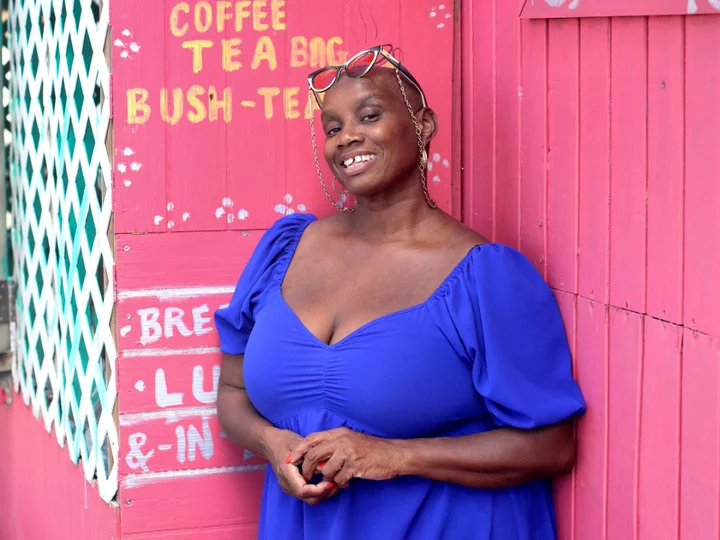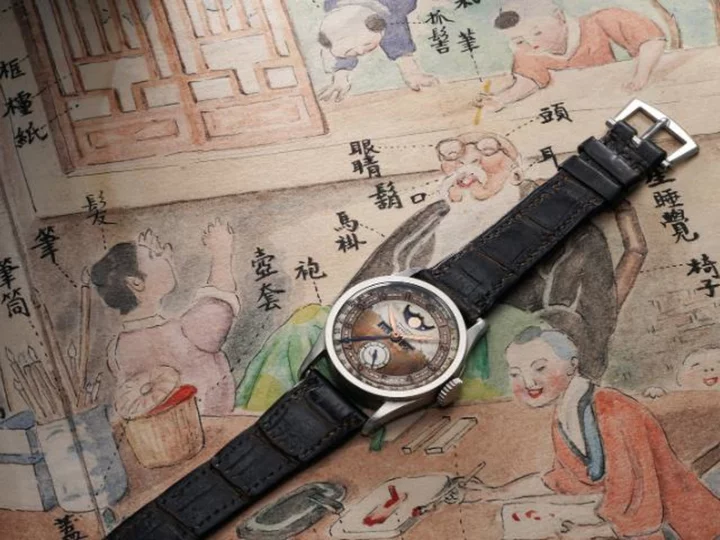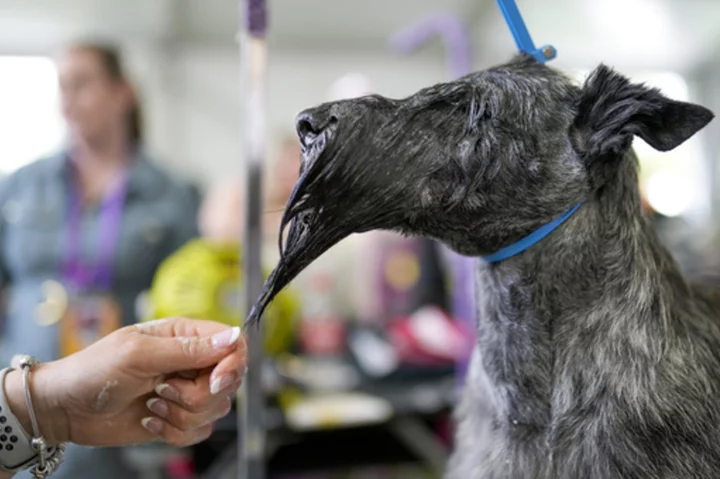
Six innovations that can help feed the world
These ideas could help feed a growing population, without harming the planet.
2023-05-09 16:18

Woman in ‘living hell’ with brain slipping down her spine after ice-skating accident
A 25-year-old who has been mostly bed bound by a painful condition that is causing her brain to slip down her spine is pleading for help to raise funds for lifesaving treatment in the US to stabilise her skeleton. Desperate to raise the £200,000 she needs, Emily Balfour, from London, said she will eventually face permanent disability and is at risk of paralysis if she does not receive PICL, a procedure that injects stem cells into the spine through the back of the mouth. An ice-skating accident at the age of 14 flagged the alarming conditions that cause Emily to now live with “relentless levels of pain”. She was diagnosed with Ehlers-Danlos syndromes (EDS), a collection of rare conditions affecting the connective tissues that make her joints unstable and prone to dislocation, as well as craniocervical instability (CCI), meaning the area where her skull and spine meet is dangerously unstable. Emily also has Chiari malformation, which means the lower part of her brain has herniated and is pushing down through the top of her spinal column. “My health is continuing to deteriorate but I still haven’t managed to raise enough money to get the treatment I need in America,” Emily said. “It would be lifesaving for me and, unless I get the treatment, my life is on pause and stagnated, I’ve become largely bed bound. “And this issue doesn’t just affect me, there are so many people with this condition who are struggling to get funds for treatment abroad. Money is the barrier for us being able to live our lives.” In 2011, Emily was first diagnosed with EDS after an ice-skating accident resulted in a trip to the doctors. I want to keep my sense of agency but it’s getting more and more difficult. Emily Balfour Once a sporty and active teen, Emily is now confined to her bed most days. Due to Chiari malformation, Emily’s brain is pushing down through the top of her spinal column and she said medical specialists have informed her that some of her brain is no longer in her skull. Emily once had dreams of working in film, but she is unable to complete her degree and is also not able to work while she struggles with her health. She said: “I’m not able to participate in life, I’m unable to work and I keep having to delay the completion of my degree. “I have limited vision, I can’t see out of my left eye and I have recently dealt with limb paralysis.” Earlier this year, Emily was rushed to hospital after her left arm became paralysed and swollen. She said: “It looked like a dead person’s arm, I feared I’d never regain mobility of it. “It turned out I was struggling with blood flow to the arm, and I’ve regained limited use of my arm, but I’m high risk of it happening again. “I’ve seen people with these conditions lose function of their arms completely and that obviously concerns me because I live by myself. “I want to keep my sense of agency but it’s getting more and more difficult.” Emily said her brainstem has been damaged to the point where her body is not functioning and she suffers daily from extreme fatigue, periods of paralysis, and loss of vision. It’s incredibly frustrating and I have to accept that I can’t live the life I thought I would. Emily Balfour As a result, Emily now finds herself largely bed bound, is regularly in and out of hospital and suffers from excruciating symptoms which threaten irreversible physical disability and potentially death. Innovative treatment in the US to stabilise her skeleton will be life-changing for Emily, but it comes at a cost. She hopes to raise £200,000 for multiple stem cell treatments, medical care and accommodation in Colorado, USA, where she will undergo a procedure known as PICL to repair and strengthen the ligaments that keep her skull stable. She said: “I’m in relentless levels of pain and, the more activity I do where I’m moving my neck, the worse the pain is. “If I don’t get treatment then it’s looking likely that eventually I will lose the use of one or both of my arms. “The longer it goes on, I’m losing more and more years of my life.” Before her diagnosis, Emily had dreams of working in film, having attended the BFI Film Academy as a teen. She also had plans to travel after finishing her English degree, which is currently on hold. Emily said: “It’s incredibly frustrating and I have to accept that I can’t live the life I thought I would. “I’m seeing other people my age having fun and building their careers but until I get the PICL procedure, I’m stuck. “There are other people who are also in my situation and it’s not an easy journey but I just hope that these treatments will be easier to access closer to home so we can get back to living.” I just want to be able to complete my degree and have a normal life and not be stuck in this living hell. Emily Balfour Emily hopes more research into EDS will result in more treatment options becoming available. For Emily, she says the procedure will be a lifeline and enable her to start living again. “Getting treatment will change everything,” she said. “I wanted to write and make films, but I am now more interested in medicine and want to get a psychotherapy qualification and work in that field. “I used to be so passionate about movies and reading, but because of my brain and vision issues, I’m restricted to audiobooks now. I can’t even do basic things like watching TV, that once brought me so much joy. “I just want to be able to complete my degree and have a normal life and not be stuck in this living hell.” To donate to Emily’s fundraiser, visit: www.gofundme.com/f/urgent-treatment-for-emily. Read More Four ‘red flag’ bowel cancer symptoms that can show two years before diagnosis Mother left ‘looking like Freddy Krueger’ reveals first skin cancer warning sign Woman ‘can barely move her hands’ after years of gel nails Charity boss speaks out over ‘traumatic’ encounter with royal aide Ukraine war’s heaviest fight rages in east - follow live
2023-05-09 15:26

Nearly $100 Billion in Election Promises Carry Potential Economic Risks for Thailand
Thai politicians are trying to outdo each other, promising voters billions of dollars worth of relief and freebies
2023-05-09 14:49

Boeing Closes In on Mega Ryanair Deal in 737 Max Endorsement
Days after the World Health Organization declared the coronavirus pandemic over, Ryanair Holdings Plc is betting big on
2023-05-09 14:46

Andi Oliver on turning 60 and channeling her anger into power
Andi Oliver was already whipping up cauliflower cheese at the age of seven, and could make a full roast dinner by the time she turned nine. So when she witnessed a home economics teacher pouring a packet of rice into a big, bubbling pan of water, leaving it to simmer then straining and rinsing it, she was puzzled to say the least. “I was like, ‘That’s not how you cook rice’. And I got kicked out of the lesson,” she says, chuckling at the memory. “I had to stand in the hallway. I was like, ‘What is she doing to the rice?'” Not that this incident derailed the culinary career of the 59-year-old chef, restauranteur and Great British Menu host, who was born in Kent and has lived in east London for 25 years. Oliver was taught to cook by her mother, who was born on the Caribbean island of Saint Kitts (her father hails from Antigua – the pair met in Leicester). Soon, she was in charge of dishing up dinner for herself and older brother Sean, who died of sickle cell anaemia in 1990, aged 27. “My mum was a teacher and my dad was off working and having philandering affairs, so when I came home from school I would make the tea for me and my brother.” Describing herself as a “latchkey kid”, Oliver doesn’t think she had a difficult childhood. “That’s just how it was,” she says, as warm and jovial during our chat as she is on TV. “I didn’t feel bad about it. I didn’t sit around wondering where my mummy was. It was just, that was life, that’s what you did, you got on with it.” Nor was she devastated when her parents eventually separated: “I was thrilled! I was delighted. They didn’t get on, they used to fight all the time. It was awful, so they were both much better when they weren’t together.” Oliver and her partner – restauranteur Garfield Hackett, with whom she shares daughter – the TV presenter – are still going strong after more than 27 years together. “The kindest man I know and my partner in life and all things” is how she describes Hackett in her inaugural cookbook, The Pepperpot Diaries. An ode to Caribbean cookery, as well as detailing essential eats, the book also chronicles three months Oliver spent in Antigua – a trip which started at Christmas 2019 and had to be extended (“the best luck in the world”) when lockdown began. How would the chef – known for her colourful outfits and infectious grin – describe the region’s cusine to the uninitiated? “The legacy in each island is very different,” she says. “But there are basic things like rice and peas, curry chicken and fried plantain, curry goat or goat water [a type of stew], fried fish. “One of the things I really hope [with this book] is that people start to think about that difference and celebrate it.” Even the classic titular dish – a slow cooked stew made with smoked beef and pork, veggies and beans – varies from island to island: “There’s a Guyanese pepperpot that’s a completely different dish to the Antiguan dish. And then they don’t really make pepperpot in Jamaica.” In her diary entries, the author doesn’t shy away from discussing the tragic history of the Caribbean, explaining how slavery influenced the islands’ food heritage. “You can’t really be in the Caribbean without thinking about those things,” Oliver says. “The legacy of that past, dark though it may be, is right there in your face.” And she’s keen to talk: “I think if you bring those things out into the light and discuss them we can divest ourselves of the pain of them and try to move forward in our lives.” Having experienced racism from a young age (“I’ve been told by people in England my whole life to ‘go home’, even though I was born here”), Oliver went through a “big angry phase” in her 20s. “When I was younger, my anger and my fury used to work against me quite a lot,” she reflects. “But now, as an adult woman who’s about to turn 60 I understand who I am and my power and where I come from and where I belong – where I have the right to be and where I want to be.” How did that angry youngster harness those emotions and channel them into a more positive outcome? “Age! Age helps enormously because you have so many different experiences. You start to learn that unbridled fury is in fact giving away your power,” she says. “You need to redirect it so that it becomes your strength, becomes the fuel and the fire that drives you – not the storm that wearies you.” ‘The Pepperpot Diaries: Stories From My Caribbean Table’ by Andi Oliver (published by DK, £27; photography by Robert Billington). Read More What is coronation chicken? The story of the royal recipe and how to make it Easy coronation chicken pie recipe chosen by Mary Berry Three one-pot recipes for washing up hater A coronation sherry cherry trifle recipe fit for a king Ainsley Harriott: Forget coronation chicken – make coronation kebabs instead Angela Hartnett: Mutton curry should be the new coronation chicken
2023-05-09 14:16

Concern over Huntington’s patients ‘turned away’ from mental health support
Many people with Huntington’s disease are being turned away from traditional mental health support, a charity has claimed as it called for more to be done to help people with the condition. Some mental health services have told patients that they do not have the specialist care needed, leading to the Huntington’s Disease Association calling for better help and support for people living with the disease. Huntington’s disease is a condition that stops parts of the brain working properly over time and can lead to problems with movement, cognition (perception, awareness, thinking, judgment) and mental health. Most people with the inherited condition will start to show symptoms between the ages of 30 and 50 and it gradually gets worse for around 10 to 25 years until the person dies. During all this time, my mental health was worsening. I’d seen my uncle commit suicide a few years before after his diagnosis and him not receiving the correct support and I was at a similar point Daniel Johnston There is no cure for Huntington’s disease or any way to stop it getting worse. A small new poll of 105 people with the condition, shared with the PA news agency, found that 85% had attempted to access community mental health services. But among this group, 56% claimed they had been denied access to care, the Huntington’s Disease Association said. Daniel Johnston, from Horam, East Sussex, said his local mental health service “didn’t know” where to refer him. The 41-year-old father of two said: “When I tested positive for Huntington’s, there was no specific pathway from that point for any mental health support. “I was confused, upset and angry about the diagnosis. I didn’t, and still don’t, fully understand my feelings of confusion and anger. “I wasn’t referred to a professional psychologist or anyone who knows how to support someone with a life-changing diagnosis such as Huntington’s. “During all this time, my mental health was worsening. I’d seen my uncle commit suicide a few years before after his diagnosis and him not receiving the correct support and I was at a similar point. “It was only when I explained to my consultant in our six-monthly appointment earlier this year the extent of my thoughts that he contacted the crisis team for me, and they began a course of daily calls for two weeks. “From this point onwards it’s been getting better, but I feel so sad for others who slip through the net so easily. “It’s as if people get afraid when you mention Huntington’s and there’s confusion around treating Huntington’s and treating mental health. “I’m not surprised by the amount of people being denied access to mental health support services due to having Huntington’s – I have been one of those people and it’s really scary.” The charity said hurdles often occur for patients after they have been referred by their GP for mental health support. Local mental health teams have told patients that Huntington’s “doesn’t fall under the remit of what they’re able to provide treatment for”. The charity has launched a new campaign, Mindful of Huntington’s, to raise awareness of the cognitive impairment symptoms of the disease, and has called for greater access to mental health support. Cath Stanley, chief executive of the Huntington’s Disease Association, said: “Many people think of Huntington’s as a disease which impacts movement, but that is only half the story, and the non-physical symptoms are often overlooked. “At the Huntington’s Disease Association, we find people will most commonly be referred to mental health services due to cognitive symptoms such as irritability and aggression. “Throughout May, we will be focusing on these cognitive symptoms and the life-changing impact they can have. “The stark findings we’re announcing can’t be ignored – people are asking for much-needed mental health support, being turned away, and their health is deteriorating further. It is disappointing but not surprising to see that there’s still a lot of misunderstanding around Huntington’s.” To find out more visit: www.hda.org.uk Read More Charity boss speaks out over ‘traumatic’ encounter with royal aide Ukraine war’s heaviest fight rages in east - follow live Scottish first minister Yousaf calls cost of coronation ‘uncomfortable’ King Charles and other royals return to work after coronation Prince Harry’s ghostwriter opens up about harassment after ‘Spare’
2023-05-09 13:51

Why eastern Europe's grain producers face a perfect storm
By Anna Koper, Gergely Szakacs and Luiza Ilie WARSAW When global grain prices started falling last year after
2023-05-09 13:27

Bank of China’s 22% Stock Surge Prompts Unusual Trading Question
Chinese speculators have a new obsession: stocks of the nation’s state-owned enterprises. A rally in government-controlled banks is
2023-05-09 13:15

Last Chinese emperor's luxury watch expected to fetch $3 million
A wristwatch once owned by China's last emperor, Puyi, is expected to fetch over $3 million when it goes on sale in Hong Kong this month.
2023-05-09 12:53

City Veteran Blames London’s Decline on ‘Narrow British Way of Life’
Jan du Plessis is quick to offer a withering assessment of the City of London’s place in the
2023-05-09 12:29

In dog show world, details obvious and subtle rule the day
Doe-eyed dachshunds, push-faced French bulldogs and other nonsporting breeds circle the hallowed rings at one of the world’s biggest dog shows
2023-05-09 12:26

Peke, Frenchie, Aussie and, yes, PBGV make dog show finals
It could be the day for the petit basset griffon Vendéen named for Buddy Holly
2023-05-09 11:58
